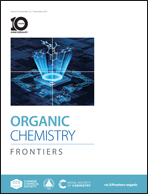BX3-mediated borylation for the synthesis of organoboron compounds
Abstract
Organoboron compounds now known as versatile building blocks are broadly used in a variety of transformations in the fields of organic synthesis, drug synthesis, and materials science. The practical and convenient synthesis methodology of organoboron compounds has been well developed. Generally, organoboron compounds are prepared through transmetalation reactions using organolithium or organomagnesium reagents, hydroboration of C–C unsaturated bonds, borylation of C![[double bond, length as m-dash]](https://www.rsc.org/images/entities/char_e001.gif) X double bonds, or borylation of C–H/C–X bonds. Among these methods, bis(pinacolato)diboron (B2pin2) and pinacol borane (HBpin) are used extensively. Recently, borylation mediated by BX3 for the efficient synthesis of organoborons has been well developed. In this review, we summarize the research on borylation driven by BX3 in the fields of organic synthesis and drug synthesis, including (1) borylative difunctionalization of C–C unsaturated bonds and (2) C–H bond borylation. The strategies of borylation processes as well as the scopes, limits, and mechanisms of these approaches are addressed.
X double bonds, or borylation of C–H/C–X bonds. Among these methods, bis(pinacolato)diboron (B2pin2) and pinacol borane (HBpin) are used extensively. Recently, borylation mediated by BX3 for the efficient synthesis of organoborons has been well developed. In this review, we summarize the research on borylation driven by BX3 in the fields of organic synthesis and drug synthesis, including (1) borylative difunctionalization of C–C unsaturated bonds and (2) C–H bond borylation. The strategies of borylation processes as well as the scopes, limits, and mechanisms of these approaches are addressed.

- This article is part of the themed collections: 2023 Organic Chemistry Frontiers HOT articles and 2023 Organic Chemistry Frontiers Review-type Articles


 Please wait while we load your content...
Please wait while we load your content...